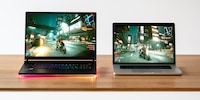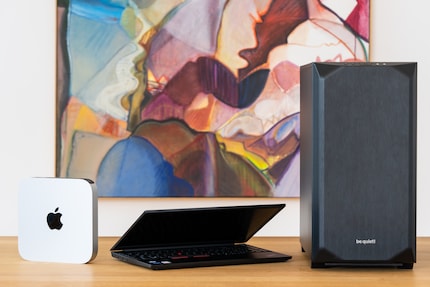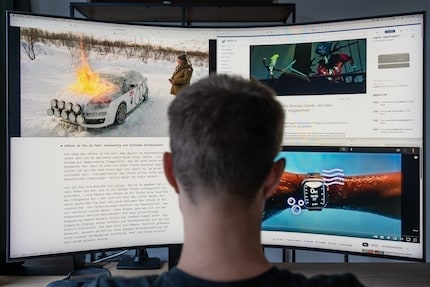
Background information
Cyberpunk 2077 on Mac: can Apple keep up with Nvidia?
by Samuel Buchmann

Depending on what kind of computer you work on, your energy consumption will vary. Sometimes greatly. Nevertheless, there’s no reason to panic if you write your e-mails on a gaming PC.
The energy crisis seems to have been averted for the moment, but there’s sure to be one in future. And ever since Covid, many employees have been working from home – including me. In view of rising electricity prices, a question arises: how much does this actually cost me? And just how big is the difference between a gaming tower and a laptop? Does it make sense to buy an efficient device exclusively for work? And how expensive is high-end gaming? I checked and calculated the exact totals.
Not all computers are the same. A high-end gaming PC needs more power than a laptop without a dedicated graphics card. Apple’s Arm chips are more efficient than x86 processors from Intel and AMD. Therefore, I let six different devices compete against each other – without claiming completeness. Clicking on any of them will take you to the exact specs:

I close the laptops for the fairest possible comparison. Thus, the internal screen doesn’t use any power. I use a Voltcraft smart plug to measure how many watt hours all my computers consume during:
By tracking the cumulative consumption over a longer period of time, I hope to get more reliable values than by measuring the current flow selectively. I extrapolate all results to watt-hours per hour. Here’s what I got.
Unsurprisingly, more powerful computers use more juice – but not only when operating, even when they’re idle. In my YouTube test, the powerful gaming PC consumes more than twice as much energy per hour as the budget version or the Intel NUC. The difference to mobile devices and the Mac Mini is even more striking. They all require only a fraction of the power.
Looking at maximum processor performance in Cinebench, it’s more of the same. In contrast to the constant power draw of a YouTube test, both the energy and output changes in this test: strong computers calculate more in the same time than weak ones. It’s all in the results. I compare energy consumption with scores achieved. In doing so, I note three things.
The mobile processor of the Lenovo laptop achieves almost twice as high a Cinebench score per watt hour as the desktop CPU. Apple’s Arm chips are in a league of their own.
First, my two desktop processors are similarly efficient when they’re pushed to the limit. The i9 uses more than three times as much power as the Ryzen 5. However, the Intel CPU also achieves a score of 37,153, while AMD’s only reaches 11,052. In other words, their scores per watt hour are almost identical. Second, mobile processors are more efficient. The i7-1255U of the Lenovo laptop achieves almost twice as high a score per watt hour as the desktop i9. Third, Apple’s Arm chips are in a league of their own. The new M2 Mac Mini in particular is extremely efficient. It achieves over twice as many points per watt hour as the Lenovo laptop and over four times as much as the i9.
It’s a similar story with in-game performance. The graphics processors for the Apple chips are also more efficient than their counterparts from Nvidia and Intel. However, these figures should be taken with a grain of salt. A single, cross-system benchmark isn’t very meaningful. If you want to game, tracking power consumption is pointless anyway: to play current games in a good resolution with high details, you need a powerful Windows PC – inefficient or not. After all, a lot of FPS per watt hour won’t do you any good if a game degenerates into a slide show. Or, in the case of MacOS, isn’t even available on the operating system in the first place.
First I’d like to know what these numbers mean for my home set-up. To do this, I need to define a scenario. In it, my computer simulates a typical work day, running steadily for ten hours daily. Naturally factoring in a lunch break and a couple of coffee breaks. I rarely, if ever, turn my work station off when I go into the kitchen. My scenario assumes a full-time job. With five weeks of vacation, this amounts to 235 working days per year. Or 2,350 operating hours. Likely fewer, if we’re being honest. After all, there are sick days, days when I have to do things outside the office or times I put the computer on standby over lunch. I therefore round the figure down to 2,200 hours.
Then I add in a colourful mix of computational load. My job involves spending most of my time writing articles or e-mails. Sometimes I edit images in Lightroom. Video calls also need some power. Since I can’t measure this comparably across all devices, I’ll make a hypothetical mixed calculation from my reference data: 80% power consumption for YouTube and 20% for Cinebench.
For the latter, I take into account that stronger processors don’t run at full load to achieve the same performance as weaker processors. I therefore scale power consumption to the Cinebench score of the Lenovo laptop – the slowest device in my test. YouTube power consumption serves as my lower limit. My calculation obviously won’t be dead accurate, since power consumption doesn’t increase linearly with performance. But there’s enough here for a rough approximation.
The differences in energy consumption are enormous in my home office. Under this scenario, my high-end device consumes around 20 times as much power as the frugal Mac Mini. A difference of 244 kilowatt hours (kWh) per year. The budget gaming PC and Intel NUC are slap bang in the middle. Lenovo’s laptop with a mobile i7 CPU needs 33 kWh, which is more than the comparatively powerful MacBook Pro with an M1 Max chip. In relation to stationary computers, however, the Lenovo’s also much more efficient.
In this office scenario, my high-end device consumes around 20 times as much power as the frugal Mac Mini.
Gaming for hours on a high-end PC and fully utilising all its components will really suck up some power. Just playing an average of 30 hours per week, I use a whopping 846 kWh per year. The cheaper PC with its Ryzen 5 and RTX 3060 draw 362 kWh – but its FPS drop proportionally to power consumption.
Even if the differences are big in relative terms, just because you’re working on a gaming PC doesn’t mean you’ll be impoverished, even if electricity prices continue to rise in the coming years. The actual added costs compared to more efficient devices are rather small in absolute terms.
I live in Winterthur, where electricity prices amount to 28.25 centimes (Rp.) per kilowatt hour (kWh). VAT excluded. Depending on the canton or country, this price varies greatly. You can find an overview of rates in Switzerland on this federal website. I calculate the annual costs of my devices using the Swiss median of 27.2 Rp./kWh.
By using a Mac Mini or an efficient Windows laptop instead of a high-end PC, I can save a little over 60 Swiss francs per year. It seems that even in this extreme case, it isn’t worth buying an efficient appliance just because of energy costs, given current electricity prices. Compared to a power-hungry desktop device, even a 600-franc Mac Mini will only pay for itself in ten years. If prices rise in the next few years, this could change. Take Germany, where prices went up to 70 cents per kilowatt hour last autumn (link in German). Under those circumstances, my high-end PC would already cost 171 euros more per year to maintain than a Mac Mini.
What’s more, an efficient computer will only pay off ecologically if you buy it instead of a powerful machine – not in addition to it. After all, electronic devices contain a fair amount of grey energy. That’s energy required in production, transport and storage.
Playing for 30 hours a week on my high-end test machine will cost me 229 francs a year.
If I want to play graphically demanding games at decent settings, there’s no alternative to a gaming PC anyway, as mentioned above. More images per second cost more energy and therefore more money. Comparisons among different devices are therefore not meaningful. Nevertheless, the absolute numbers are interesting: 30 hours of gaming per week on a high-end PC would cost me 229 francs annually.
Your personal device and its usage probably differ wildly from my examples. These are only meant to serve as reference points which you can use in your own tests. And, of course, a computer isn’t the only thing that needs power in a home office; other devices are also plugged in.
Large screens, for example, are often the bigger power guzzlers than your average PC. My current overall set-up with MacBook Pro, 34-inch QD OLED monitor, small speakers and docking station draws over 100 watts in office mode. Only a small part of that flows into the laptop. If I were to swap the MacBook for a stationary and powerful PC, consumption would increase to 200 watts. In my scenario, this amounts to 120 francs per year.

These amounts aren’t minimal, but still rather small compared to the cost of other devices. The typical energy consumption of a two-person household in an apartment building is 2,750 kWh per year according to the Swiss Federal Office of Energy. That’s 748 francs according to the current median price (PDF in German). The biggest electricity guzzlers are household and kitchen appliances such as refrigerators, stoves and washing machines.
A powerful desktop computer eats up power, even with light fare such as office applications. An efficient laptop only needs a fraction of the energy to manage this. Apple’s ARM chips are even more frugal, as they achieve considerably more performance per watt than x86 processors from Intel and AMD. The differences are impressive at first glance: in my scenario, a Mac Mini only uses five per cent of the energy of a high-end PC per year – a difference of 244 kilowatt hours.
Sounds like a lot, but it only leaves a small impact on your wallet. 244 kilowatt hours cost just 66 francs at the current Swiss median electricity price. Even if you work on a powerful gaming PC, you won’t go bankrupt because of it – and definitely don’t buy a more efficient device just for saving power. This would be neither financially nor ecologically viable. Should prices rise sharply one day, this recommendation could change.
It’d be great if the Intel, AMD and Nvidia holy trinity could catch up with Apple in terms of efficiency. This could also become a selling point for gamers suffering under rising electricity prices. Anyone who games 30 hours per week on a PC similar to my high-end test device currently pays an average of 229 francs per year for the pleasure. At higher rates, this amount will only increase. If a manufacturer manages to make its chips more efficient, it could save hundreds of francs in energy costs over a device’s lifespan.
Header image: Samuel Buchmann
My fingerprint often changes so drastically that my MacBook doesn't recognise it anymore. The reason? If I'm not clinging to a monitor or camera, I'm probably clinging to a rockface by the tips of my fingers.
Interesting facts about products, behind-the-scenes looks at manufacturers and deep-dives on interesting people.
Show all